Quick facts
The ten safest states for driving:
- 10) Connecticut (0.93 fatalities per 100 million vehicle miles, -56% change since 1975)
- 9) Wisconsin (0.89 fatalities per 100 million vehicle miles, -73% change since 1975)
- 8) Washington (0.88 fatalities per 100 million vehicle miles, -72% change since 1975)
- 7) Maryland (0.84 fatalities per 100 million vehicle miles, -68% change since 1975)
- 6) Utah (0.81 fatalities per 100 million vehicle miles, -76% change since 1975)
- 5) New York (0.76 fatalities per 100 million vehicle miles, -79% change since 1975)
- 4) Rhode Island (0.74 fatalities per 100 million vehicle miles, -62% change since 1975)
- 3) New Jersey (0.73 fatalities per 100 million vehicle miles, -66% change since 1975)
- 2) Minnesota (0.63 fatalities per 100 million vehicle miles, -79% change since 1975)
- 1) Massachusetts (0.54 fatalities per 100 million vehicle miles, -80% change since 1975)
The ten most dangerous states for driving:
- 10) Montana (1.43 fatalities per 100 million vehicle miles, -72% change since 1975)
- 9) New Mexico (1.43 fatalities per 100 million vehicle miles, -74% change since 1975)
- 8) Oklahoma (1.44 fatalities per 100 million vehicle miles, -57% change since 1975)
- 7) Alaska (1.46 fatalities per 100 million vehicle miles, -67% change since 1975)
- 6) Kentucky (1.46 fatalities per 100 million vehicle miles, -58% change since 1975)
- 5) West Virginia (1.51 fatalities per 100 million vehicle miles, -65% change since 1975)
- 4) Arizona (1.53 fatalities per 100 million vehicle miles, -63% change since 1975)
- 3) Louisiana (1.53 fatalities per 100 million vehicle miles, -67% change since 1975)
- 2) Mississippi (1.63 fatalities per 100 million vehicle miles, -57% change since 1975)
- 1) South Carolina (1.83 fatalities per 100 million vehicle miles, -54% change since 1975)
Those heartening statistics come even as people drive more and are part of a 40-year downward trend. Experts point to a raft of safety measures, from increased use of seat belts to vehicle improvements such as air bags and electronic stability control.
But there are some sober warnings among the numbers. More than 6,000 pedestrians died, the most since 1990, and motorcycle fatalities were up by almost 5%. The same was true for bicyclist deaths, which were up more than 6%, as well as an almost 1% increase for the occupants of large trucks.
For those of you who live in cities, here is a trend to keep an eye on: Over the last decade, traffic deaths in urban neighborhoods have been on the rise, and have surpassed deaths in rural areas since 2016. Among the kinds of accidents that have become deadlier in cities, pedestrian deaths were up 69%, bicycling deaths were up 48%, and motorcycle deaths were up 33%.
Reviews.com compiled a list of the most dangerous states for driving using data from the National Highway Traffic Safety Administration and from analysis by the Insurance Institute for Highway Safety. There were a total of 36,560 deaths as a result of motor vehicle crashes in the U.S. in 2018, the year these figures cover. States are ranked by 2018 fatalities per 100 million vehicle travel miles. The data was released in 2019.
Take a look at how your state compares, and always drive safely.
[ Read: The Best Car Insurance Companies for 2020 ]
#50. Massachusetts
– Fatalities per 100 million vehicle miles: 0.54 (-80% change since 1975)
– Total fatalities: 360 (-58.0% change since 1975)
– Percent of fatalities related to speeding: 26.4% (#31 highest of all states)
– Percent of fatalities with a driver over .08 BAC: 33.3% (#8 highest of all states)
– Deaths by road user type: 49.1% car, 25.6% light trucks, 2.9% large trucks, 21.3% motorcycles, 1.1% other or unknown
A law banning handheld phone use went into effect this year a decade after drivers were prohibited from sending or reading texts. Nearly three of every four Massachusetts drivers and front-seat passengers wear seat belts, which have saved more than 374,000 lives between 1975 and 2017 around the country. Massachusetts was also among the states with the lowest percentage of fatalities on rural roads.

Canva
#49. Minnesota
– Fatalities per 100 million vehicle miles: 0.63 (-79% change since 1975)
– Total fatalities: 381 (-49.0% change since 1975)
– Percent of fatalities related to speeding: 29.7% (#22 highest of all states)
– Percent of fatalities with a driver over .08 BAC: 27.6% (#28 highest of all states)
– Deaths by road user type: 41.3% car, 35.8% light trucks, 1.2% large trucks, 18.0% motorcycles, 3.7% other or unknown
Minnesotans are vigilant about seat belt use, with 94% of drivers and front-seat passengers wearing them, above the national average. In fact, based on a primary law, police are allowed to stop drivers solely for failing to wear one. And as of last year, drivers cannot hold a phone in their hands.
Recently, though, police are warning of an uptick in speeding, running red lights and stop signs, and crashes resulting in death.
[ Read: The Best Cheap Auto Insurance Companies of 2020 ]

Canva
#48. New Jersey
– Fatalities per 100 million vehicle miles: 0.73 (-66% change since 1975)
– Total fatalities: 564 (-46.0% change since 1975)
– Percent of fatalities related to speeding: 20.2% (#41 highest of all states)
– Percent of fatalities with a driver over .08 BAC: 22.2% (#45 highest of all states)
– Deaths by road user type: 54.2% car, 26.1% light trucks, 3.5% large trucks, 14.3% motorcycles, 1.9% other or unknown
New Jersey’s seat belt use is just above the national average at 88%. The state prohibited handheld or hands-free use of phones and has one of the country’s strictest graduated license laws, which imposes restrictions on when a new driver can be on the road, and limits how many passengers he or she can have.

Canva
#47. Rhode Island
– Fatalities per 100 million vehicle miles: 0.74 (-62% change since 1975)
– Total fatalities: 59 (-46.0% change since 1975)
– Percent of fatalities related to speeding: 45.8% (#3 highest of all states)
– Percent of fatalities with a driver over .08 BAC: 33.9% (#6 highest of all states)
– Deaths by road user type: 36.0% car, 24.0% light trucks, 0.0% large trucks, 36.0% motorcycles, 4.0% other or unknown
A group called Advocates for Highway and Auto Safety, an alliance of public safety, law enforcement, insurance companies, and other groups, gave Rhode Island top marks for its safety laws, including a ban on texting and requiring seat belt use. What’s missing? Mandating helmets for motorcycle riders, nighttime restrictions for new drivers, and limiting an unrestricted license to those 18 and older.
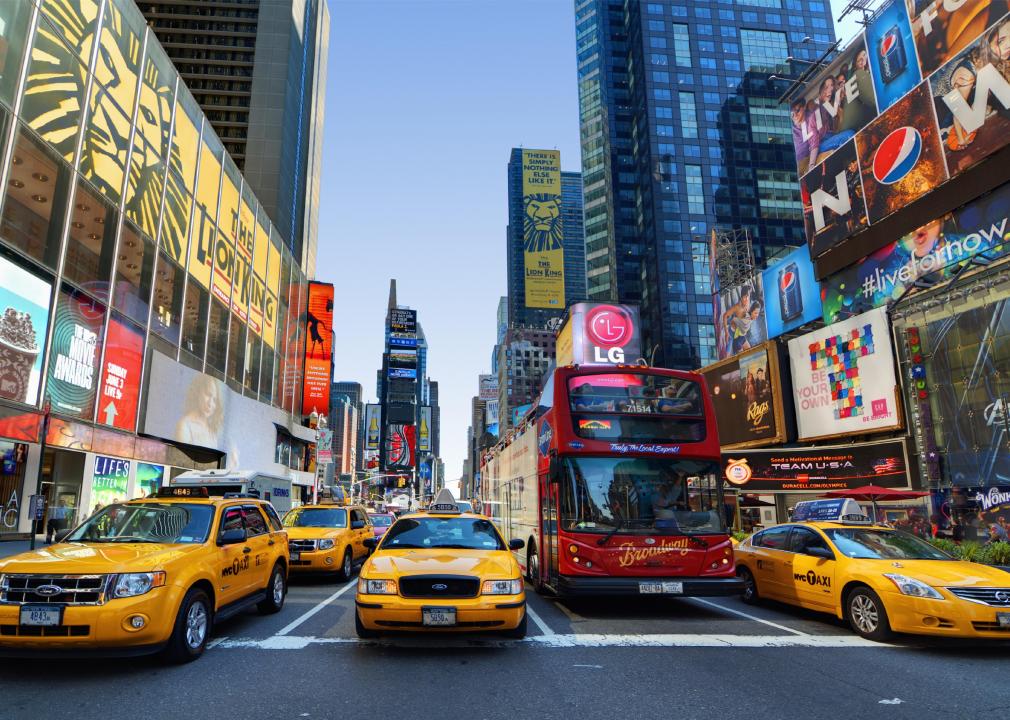
Sean Pavone // Shutterstock
#46. New York
– Fatalities per 100 million vehicle miles: 0.76 (-79% change since 1975)
– Total fatalities: 943 (-60.0% change since 1975)
– Percent of fatalities related to speeding: 29.1% (#24 highest of all states)
– Percent of fatalities with a driver over .08 BAC: 32.6% (#10 highest of all states)
– Deaths by road user type: 45.6% car, 26.3% light trucks, 1.5% large trucks, 23.0% motorcycles, 3.6% other or unknown
New York City is cracking down on dangerous drivers who’ve been caught repeatedly speeding or running red lights. These drivers could end up losing their cars under a law passed this year. The state will also extend the requirement to all passengers over the age of 16 in November.
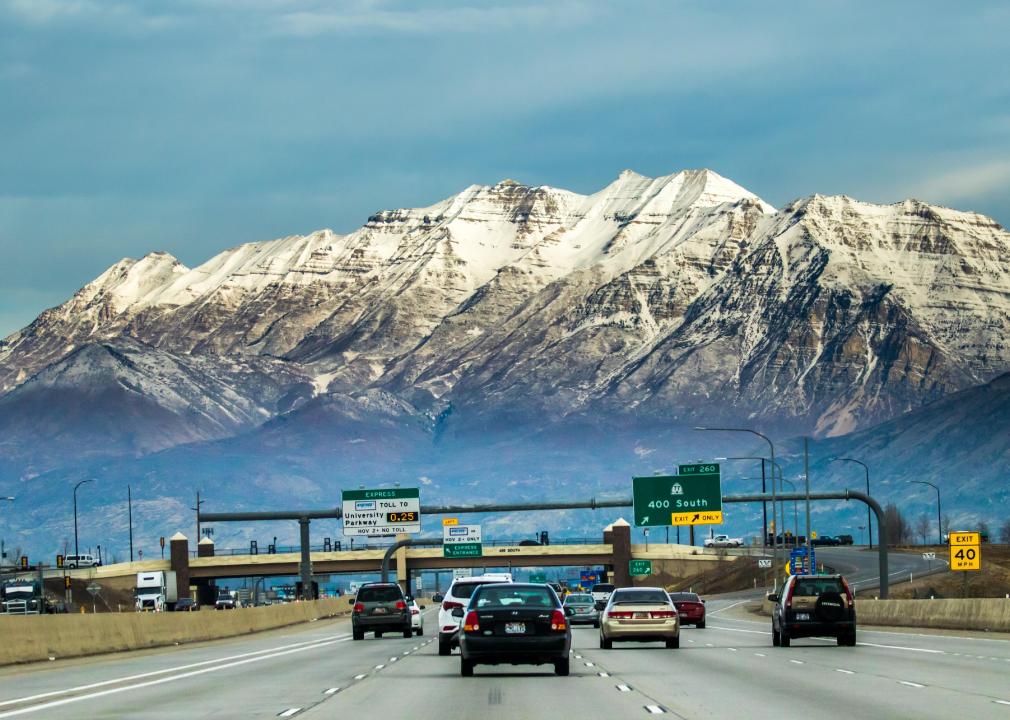
Bob Pool // Shutterstock
#45. Utah
– Fatalities per 100 million vehicle miles: 0.81 (-76% change since 1975)
– Total fatalities: 260 (-4.0% change since 1975)
– Percent of fatalities related to speeding: 26.9% (#30 highest of all states)
– Percent of fatalities with a driver over .08 BAC: 23.5% (#43 highest of all states)
– Deaths by road user type: 38.4% car, 32.9% light trucks, 3.7% large trucks, 21.5% motorcycles, 3.7% other or unknown
Utah has among the lowest percentages of alcohol-impaired driving fatalities among all traffic fatalities. In 2018, it became the first state to lower its drunk driving limit, or blood alcohol content, to 0.05%, a recommendation from the National Transportation Safety Board.
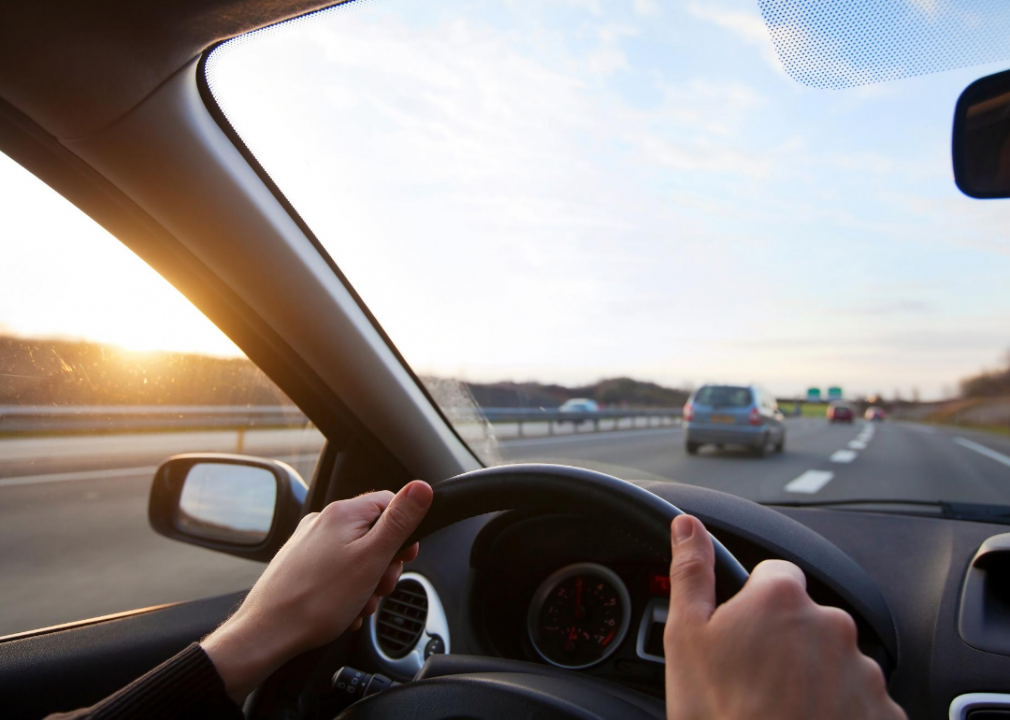
Canva
#44. Maryland
– Fatalities per 100 million vehicle miles: 0.84 (-68% change since 1975)
– Total fatalities: 501 (-25.0% change since 1975)
– Percent of fatalities related to speeding: 24.6% (#35 highest of all states)
– Percent of fatalities with a driver over .08 BAC: 24.4% (#42 highest of all states)
– Deaths by road user type: 52.9% car, 27.1% light trucks, 2.5% large trucks, 17.0% motorcycles, 0.5% other or unknown
Maryland toughened its “driving under the influence” (DUI) laws last year by increasing penalties for drivers with prior convictions and those who kill someone. Like Utah, it has one of the lowest percentages of alcohol-related driving fatalities in the U.S.
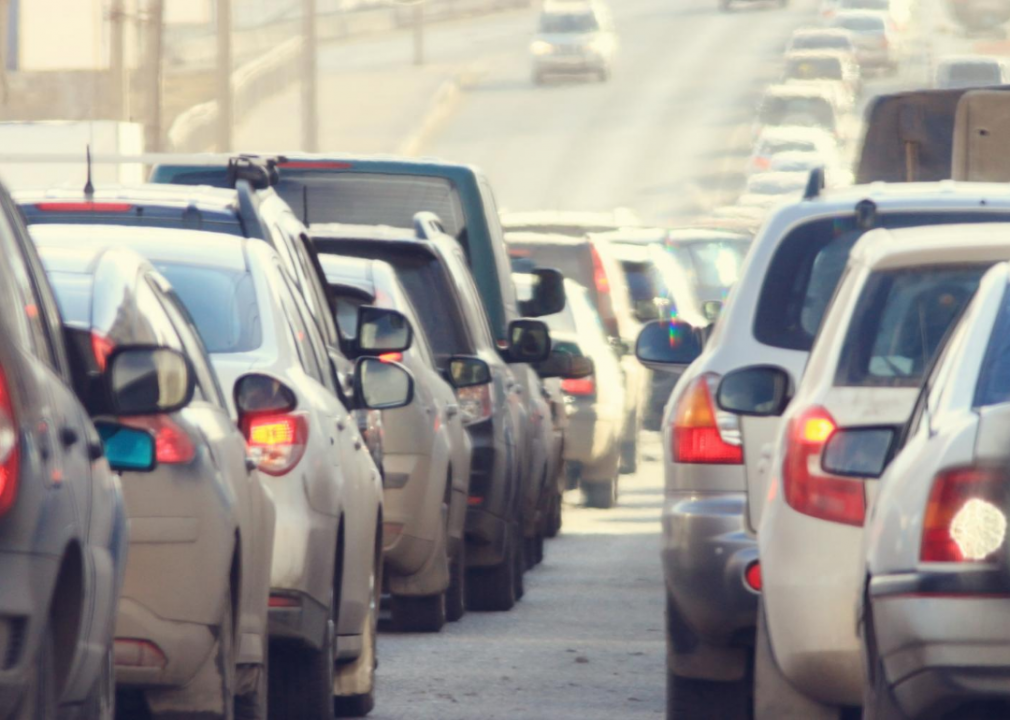
Canva
#43. Washington
– Fatalities per 100 million vehicle miles: 0.88 (-72% change since 1975)
– Total fatalities: 546 (-28.0% change since 1975)
– Percent of fatalities related to speeding: 32.8% (#16 highest of all states)
– Percent of fatalities with a driver over .08 BAC: 30.4% (#13 highest of all states)
– Deaths by road user type: 43.6% car, 34.4% light trucks, 2.1% large trucks, 18.9% motorcycles, 0.9% other or unknown
In the state of Washington, almost everyone wears seat belts, with the percentage of drivers and front-seat passengers buckling up coming in at 97%. As of 2017, drivers cannot hold their phones even while stopped in traffic (no drinking coffee or applying makeup, either). Washington has been out front on battling distracted driving, and more than a decade ago, it became the first state to ban texting while driving.
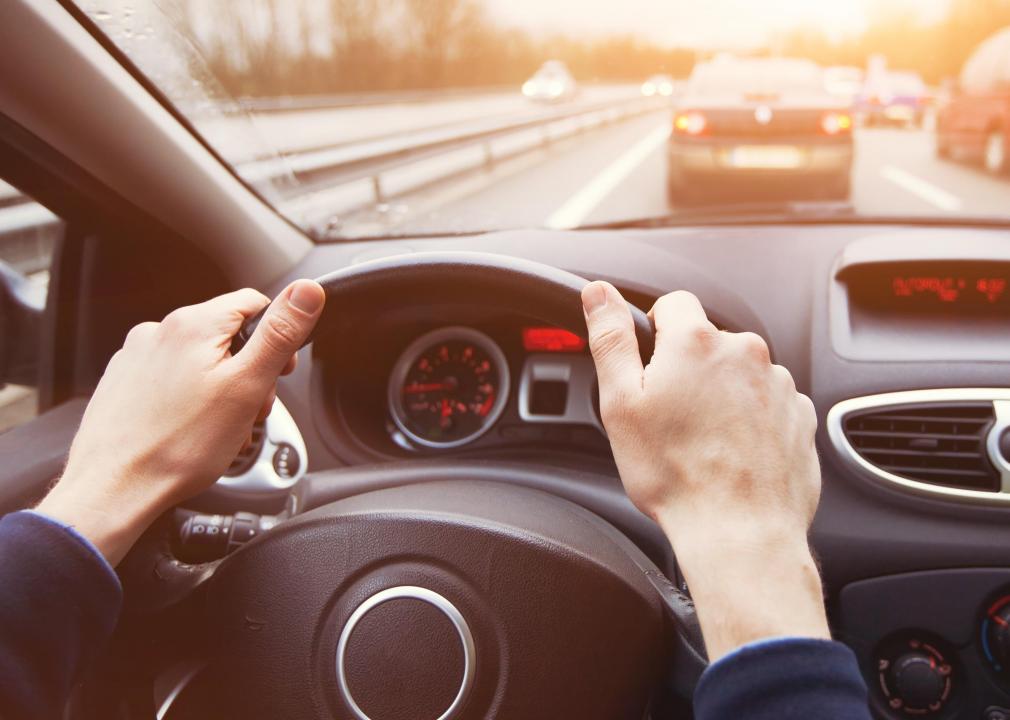
Song_about_summer // Shutterstock
#42. Wisconsin
– Fatalities per 100 million vehicle miles: 0.89 (-73% change since 1975)
– Total fatalities: 588 (-37.0% change since 1975)
– Percent of fatalities related to speeding: 31.6% (#17 highest of all states)
– Percent of fatalities with a driver over .08 BAC: 33.8% (#7 highest of all states)
– Deaths by road user type: 43.5% car, 35.2% light trucks, 2.7% large trucks, 15.8% motorcycles, 2.9% other or unknown
Wisconsin considers a first-time drunk driving offense a traffic violation rather than a crime, which some lawmakers have been trying to change. The percentage of alcohol-impaired driving fatalities is higher in Wisconsin than in any neighboring state. Some Wisconsin legislators also want to expand laws governing phone use while driving. While texting has been banned since 2010, lawmakers have been considering legislation requiring all phone use be hands-free while driving.
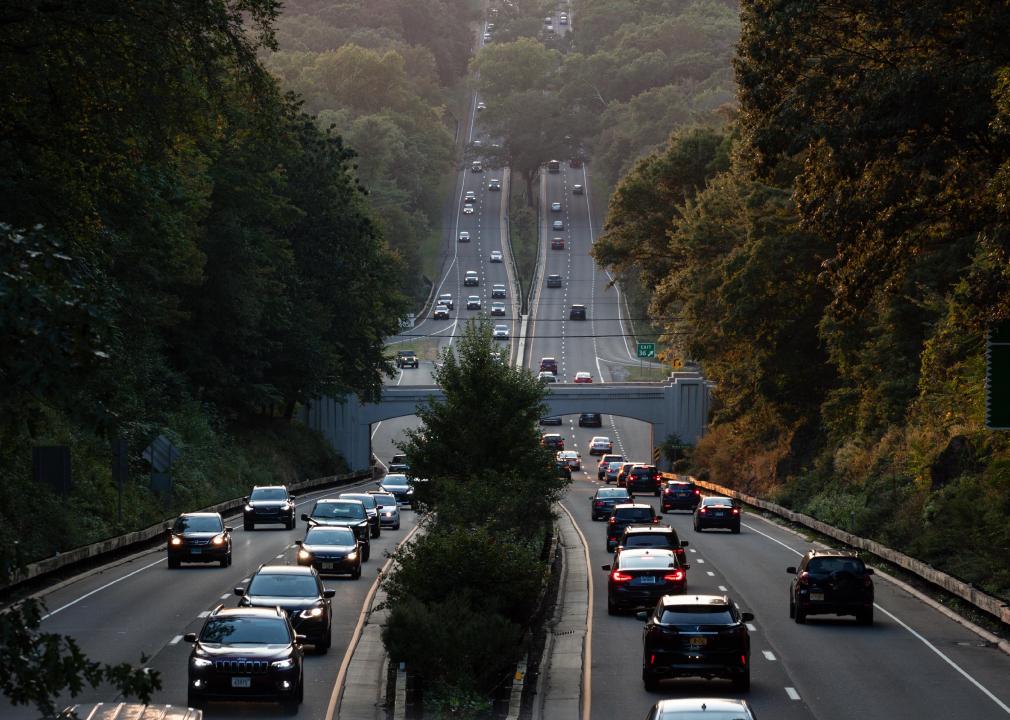
barbsimages // Shutterstock
#41. Connecticut
– Fatalities per 100 million vehicle miles: 0.93 (-56% change since 1975)
– Total fatalities: 294 (-24.0% change since 1975)
– Percent of fatalities related to speeding: 30.6% (#19 highest of all states)
– Percent of fatalities with a driver over .08 BAC: 39.1% (#3 highest of all states)
– Deaths by road user type: 52.8% car, 21.5% light trucks, 3.9% large trucks, 21.0% motorcycles, 0.9% other or unknown
Some 87% of Connecticut drivers and front-seat passengers wear their seat belts, just over the national average. The state’s Department of Public Health has recommended that everyone in a vehicle be required to buckle up to improve safety. The percentage of fatal crashes involving a drunk driver was one of the highest in the country in 2017—only Washington D.C.’s rate was higher.

All About Space // Shutterstock
#40. Maine
– Fatalities per 100 million vehicle miles: 0.93 (-70% change since 1975)
– Total fatalities: 137 (-39.0% change since 1975)
– Percent of fatalities related to speeding: 30.7% (#18 highest of all states)
– Percent of fatalities with a driver over .08 BAC: 30.7% (#11 highest of all states)
– Deaths by road user type: 41.4% car, 37.5% light trucks, 0.0% large trucks, 18.0% motorcycles, 3.1% other or unknown
Maine gets good marks for its driving safety laws from the Advocates for Highway and Auto Safety, though it recommends requiring helmets for all motorcycle riders, placing restrictions on young drivers, and prohibiting open containers. A law requiring hands-free phone use took effect last year, but the state’s transportation officials warn that chronic underfunding has prevented the state from investing more in its roads and bridges, a potential hazard for drivers.

Isamare // Shutterstock
#39. Ohio
– Fatalities per 100 million vehicle miles: 0.93 (-66% change since 1975)
– Total fatalities: 1,068 (-40.0% change since 1975)
– Percent of fatalities related to speeding: 27.2% (#29 highest of all states)
– Percent of fatalities with a driver over .08 BAC: 27.5% (#29 highest of all states)
– Deaths by road user type: 50.3% car, 29.6% light trucks, 3.0% large trucks, 15.9% motorcycles, 1.2% other or unknown
Ohio is considering raising the age for a probationary driver’s license to 16-and-a-half from 16 so that teenagers would drive with a permit for a year instead of six months. Nonprofit Advocates for Highway and Auto Safety cited Ohio’s lack of graduated driver licensing as one reason for its poor showing in its 2020 report on safety. The group also recommended tougher motorcycle and helmet laws, among other changes.
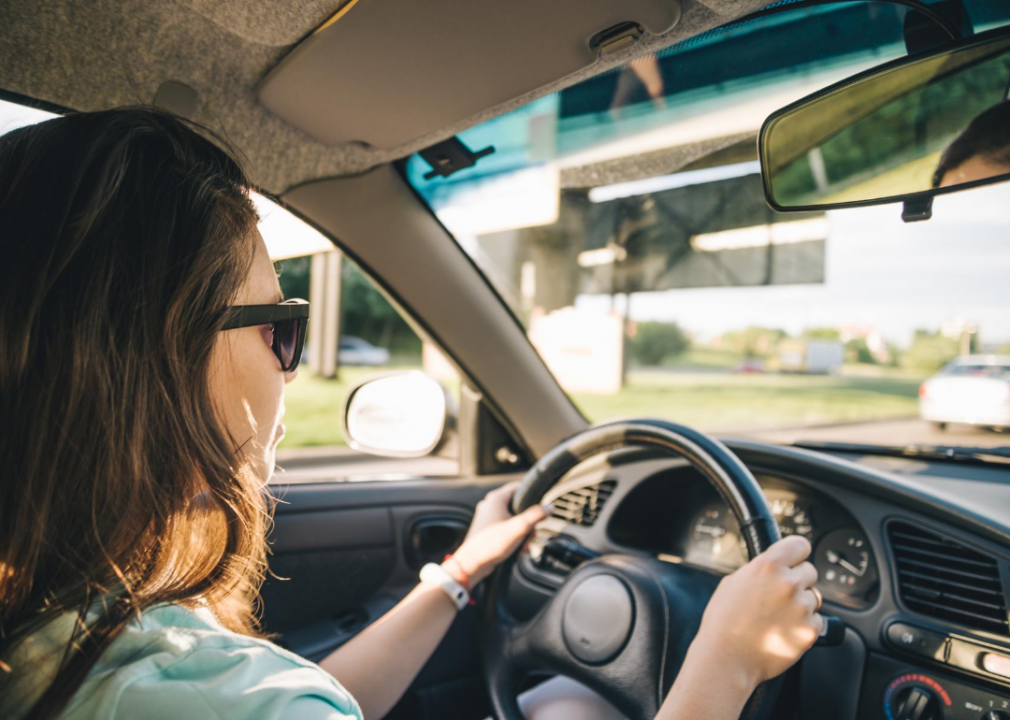
Canva
#38. Vermont
– Fatalities per 100 million vehicle miles: 0.93 (-78% change since 1975)
– Total fatalities: 68 (-52.0% change since 1975)
– Percent of fatalities related to speeding: 36.8% (#12 highest of all states)
– Percent of fatalities with a driver over .08 BAC: 22.1% (#47 highest of all states)
– Deaths by road user type: 54.8% car, 29.0% light trucks, 3.2% large trucks, 11.3% motorcycles, 1.6% other or unknown
Vermont had one of the highest percentages of fatalities on rural roads in 2018. The state requires seat belt use from the driver and all passengers. For the driver and front-seat passenger, compliance is at 84%, just under the national average.
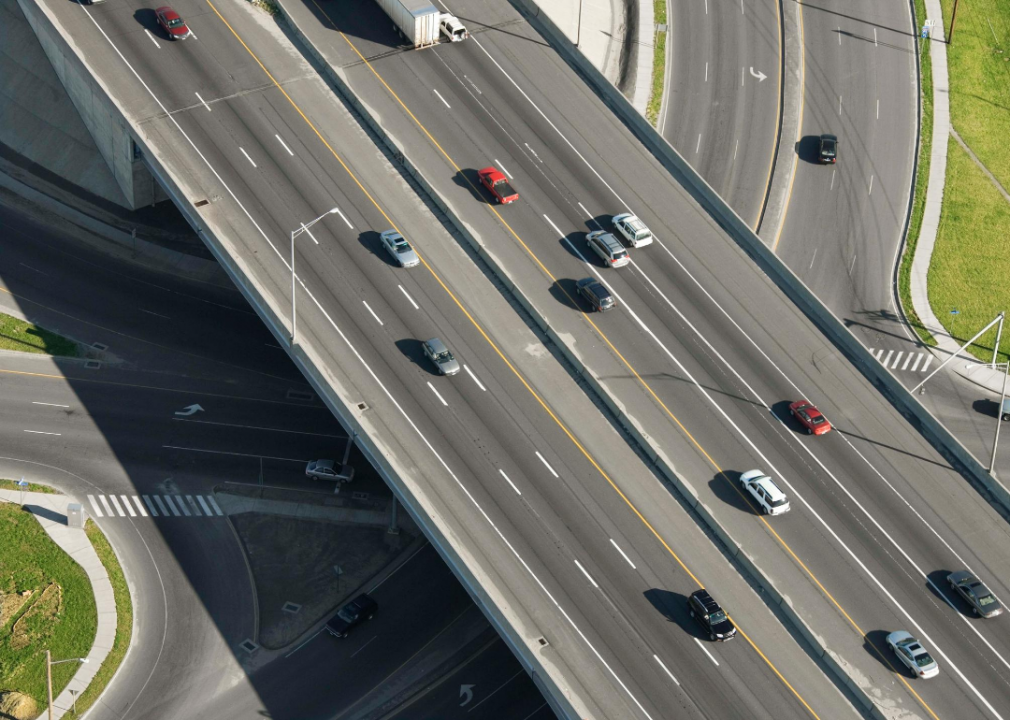
Canva
#37. Michigan
– Fatalities per 100 million vehicle miles: 0.95 (-69% change since 1975)
– Total fatalities: 974 (-45.0% change since 1975)
– Percent of fatalities related to speeding: 25.2% (#34 highest of all states)
– Percent of fatalities with a driver over .08 BAC: 27.4% (#30 highest of all states)
– Deaths by road user type: 45.5% car, 33.9% light trucks, 1.2% large trucks, 17.7% motorcycles, 1.6% other or unknown
Michigan’s seat belt law was passed 35 years ago, but the home of the auto industry initially fought the new regulation. Today, compliance is high at 94%. The number of Michigan’s drunk-driving crashes rose by more than 10% in 2018, with most taking place on local roads, spurring Mothers Against Drunk Driving to call on state lawmakers to mandate ignition interlocks (which measure alcohol levels) for all convicted drunk drivers.

GagliardiPhotography // Shutterstock
#36. Illinois
– Fatalities per 100 million vehicle miles: 0.96 (-73% change since 1975)
– Total fatalities: 1,031 (-49.0% change since 1975)
– Percent of fatalities related to speeding: 42.1% (#6 highest of all states)
– Percent of fatalities with a driver over .08 BAC: 30.0% (#16 highest of all states)
– Deaths by road user type: 48.1% car, 31.2% light trucks, 3.7% large trucks, 14.2% motorcycles, 2.8% other or unknown
Last year, Illinois defined the use of any kind of handheld electronic device while driving, including phones, as a moving violation. Your license can be suspended after you receive three tickets in a year. Hands-free calls are allowed.
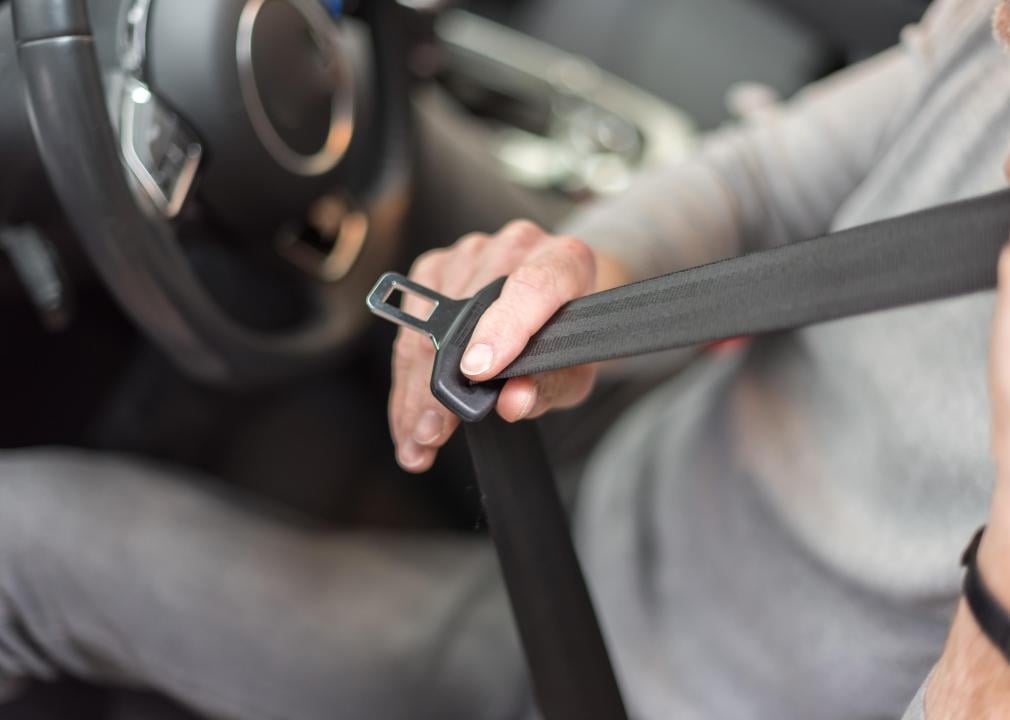
thodonal88 // Shutterstock
#35. Iowa
– Fatalities per 100 million vehicle miles: 0.96 (-74% change since 1975)
– Total fatalities: 318 (-53.0% change since 1975)
– Percent of fatalities related to speeding: 19.5% (#43 highest of all states)
– Percent of fatalities with a driver over .08 BAC: 26.7% (#31 highest of all states)
– Deaths by road user type: 40.1% car, 37.0% light trucks, 2.8% large trucks, 14.9% motorcycles, 5.1% other or unknown
Iowa is considering expanding its ban on texting while driving to make it illegal to use a phone except hands-free, though you would be allowed to accept or disconnect a call. Twenty-two states prohibit the use of handheld phones while driving, covering all drivers.
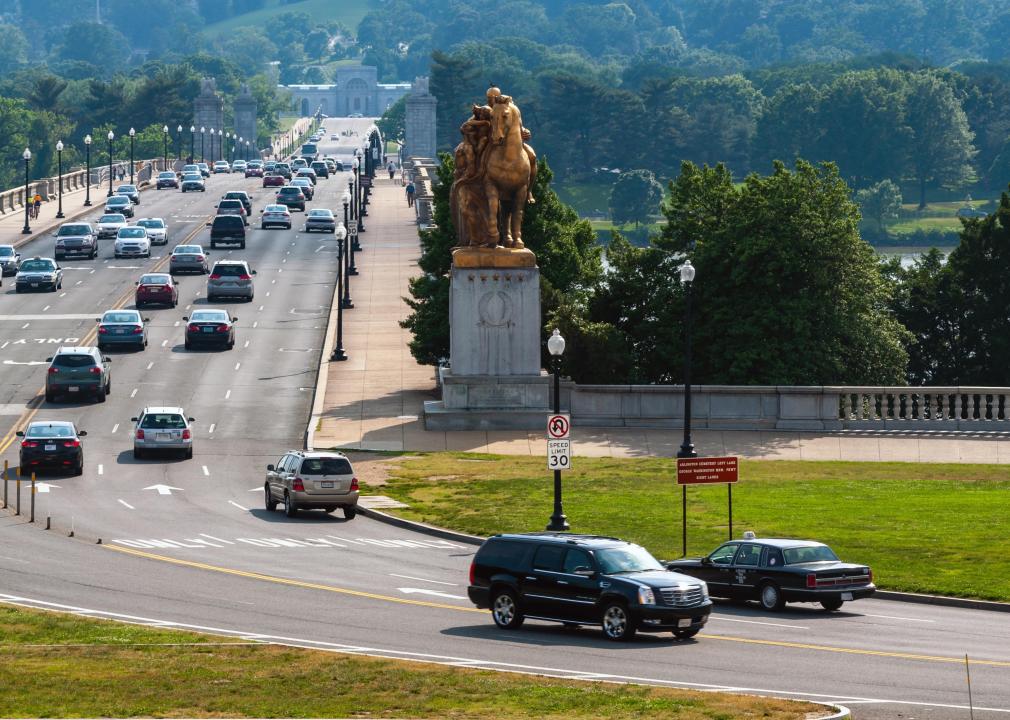
Mattsociety // Shutterstock
#34. Virginia
– Fatalities per 100 million vehicle miles: 0.96 (-67% change since 1975)
– Total fatalities: 820 (-17.0% change since 1975)
– Percent of fatalities related to speeding: 29.4% (#23 highest of all states)
– Percent of fatalities with a driver over .08 BAC: 29.3% (#20 highest of all states)
– Deaths by road user type: 48.6% car, 32.3% light trucks, 3.6% large trucks, 14.6% motorcycles, 0.8% other or unknown
Virginia drivers face a new ban on handheld mobile devices, including phones, while driving. The new law brings the state in line with Maryland, Washington D.C., and about two-dozen other states. Virginia is also making it more expensive to speed.

TierneyMJ // Shutterstock
#33. California
– Fatalities per 100 million vehicle miles: 1.02 (-67% change since 1975)
– Total fatalities: 3,563 (-13.0% change since 1975)
– Percent of fatalities related to speeding: 26.0% (#32 highest of all states)
– Percent of fatalities with a driver over .08 BAC: 30.0% (#15 highest of all states)
– Deaths by road user type: 49.1% car, 28.4% light trucks, 1.8% large trucks, 19.7% motorcycles, 1.0% other or unknown
California is taking new steps to confront distracted driving. Under a new law that goes into effect next year, drivers caught using a handheld phone could see a point added to their licenses—if the offense occurs within 36 months of a previous conviction.
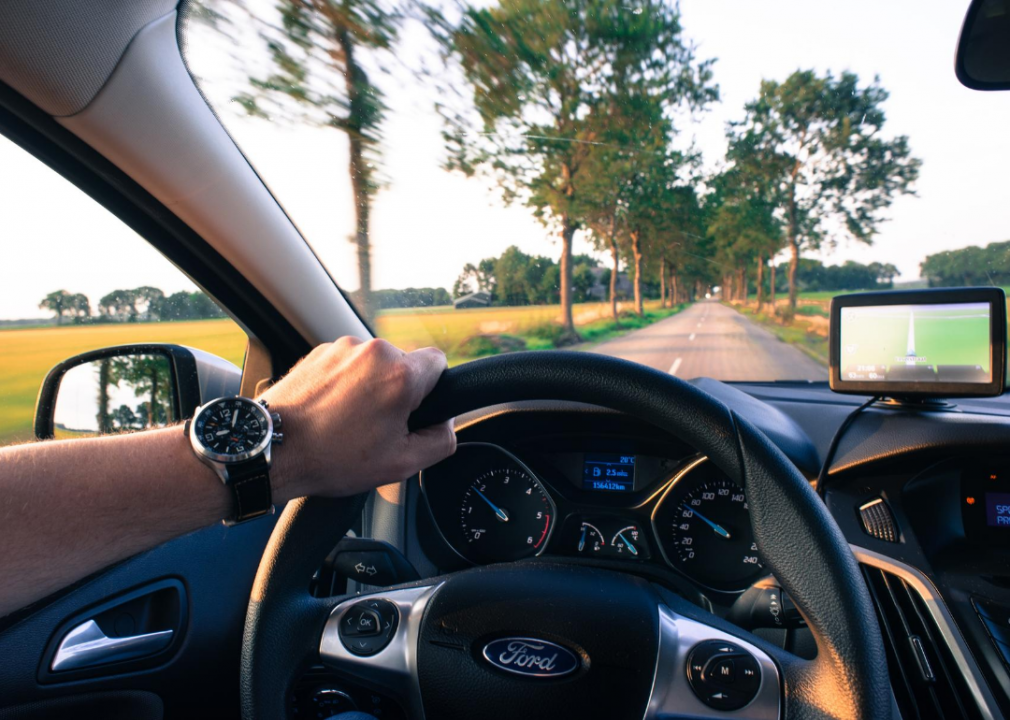
Canva
#32. Indiana
– Fatalities per 100 million vehicle miles: 1.05 (-65% change since 1975)
– Total fatalities: 858 (-24.0% change since 1975)
– Percent of fatalities related to speeding: 21.9% (#39 highest of all states)
– Percent of fatalities with a driver over .08 BAC: 26.5% (#32 highest of all states)
– Deaths by road user type: 46.2% car, 32.4% light trucks, 3.4% large trucks, 16.4% motorcycles, 1.6% other or unknown
Of a total of 435 drivers killed, Indiana reported a blood alcohol concentration for only 115. At 26%, Indiana’s reporting rate is the lowest in the country and compares to a high of 100% for Washington D.C. Nationally, the rate was 65%.
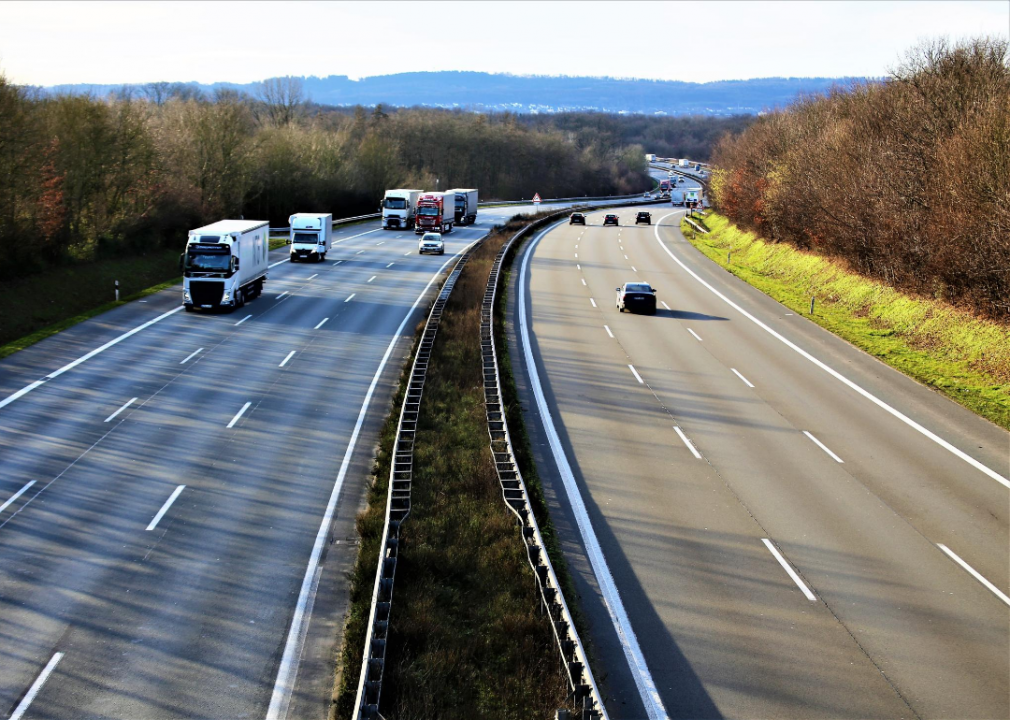
Canva
#31. Wyoming
– Fatalities per 100 million vehicle miles: 1.06 (-80% change since 1975)
– Total fatalities: 111 (-47.0% change since 1975)
– Percent of fatalities related to speeding: 34.2% (#13 highest of all states)
– Percent of fatalities with a driver over .08 BAC: 30.6% (#12 highest of all states)
– Deaths by road user type: 23.8% car, 49.5% light trucks, 9.5% large trucks, 14.3% motorcycles, 2.9% other or unknown
When it comes to the different types of vehicles in fatal crashes, Wyoming saw its highest percentage of deaths among drivers and passengers in SUVs and pickup trucks. A much lower percentage of deaths involved those traveling in cars.

Ekaterina Kondratova // Shutterstock
#30. Hawaii
– Fatalities per 100 million vehicle miles: 1.07 (-69% change since 1975)
– Total fatalities: 117 (-19.0% change since 1975)
– Percent of fatalities related to speeding: 43.6% (#4 highest of all states)
– Percent of fatalities with a driver over .08 BAC: 29.9% (#17 highest of all states)
– Deaths by road user type: 22.5% car, 29.6% light trucks, 0.0% large trucks, 47.9% motorcycles, 0.0% other or unknown
Hawaii had the highest percentage of pedestrian deaths among its fatalities at 36% and a high percentage of motorcycle deaths at 29%. By contrast, the percentage of deaths in cars, SUVs and pickups was relatively low. Critics say Hawaii needs a universal helmet law, as in the current one covers only those under the age of 18.

Rudmer Zwerver // Shutterstock
#29. New Hampshire
– Fatalities per 100 million vehicle miles: 1.07 (-62% change since 1975)
– Total fatalities: 147 (-3.0% change since 1975)
– Percent of fatalities related to speeding: 48.3% (#2 highest of all states)
– Percent of fatalities with a driver over .08 BAC: 32.7% (#9 highest of all states)
– Deaths by road user type: 40.6% car, 33.1% light trucks, 5.3% large trucks, 21.1% motorcycles, 0.0% other or unknown
Seat belts are required to be worn by drivers and front-seat passengers everywhere in the U.S. except New Hampshire, which has no seat belt law governing adults. Only 69% of New Hampshire drivers and front-seat passengers wear them, well below the national average of 86%. New Hampshire also had the lowest seat belt use among those killed in crashes at only 28%.

Peshkova // Shutterstock
#28. North Dakota
– Fatalities per 100 million vehicle miles: 1.07 (-71% change since 1975)
– Total fatalities: 105 (-37.0% change since 1975)
– Percent of fatalities related to speeding: 38.1% (#10 highest of all states)
– Percent of fatalities with a driver over .08 BAC: 27.6% (#27 highest of all states)
– Deaths by road user type: 22.7% car, 55.7% light trucks, 3.1% large trucks, 16.5% motorcycles, 2.1% other or unknown
North Dakota was one of three states with the highest percentage of deaths from vehicle crashes on rural roads at 87%—the others were South Dakota (90%) and Vermont (88%). Across the country, 45% of vehicular deaths occurred in rural areas.
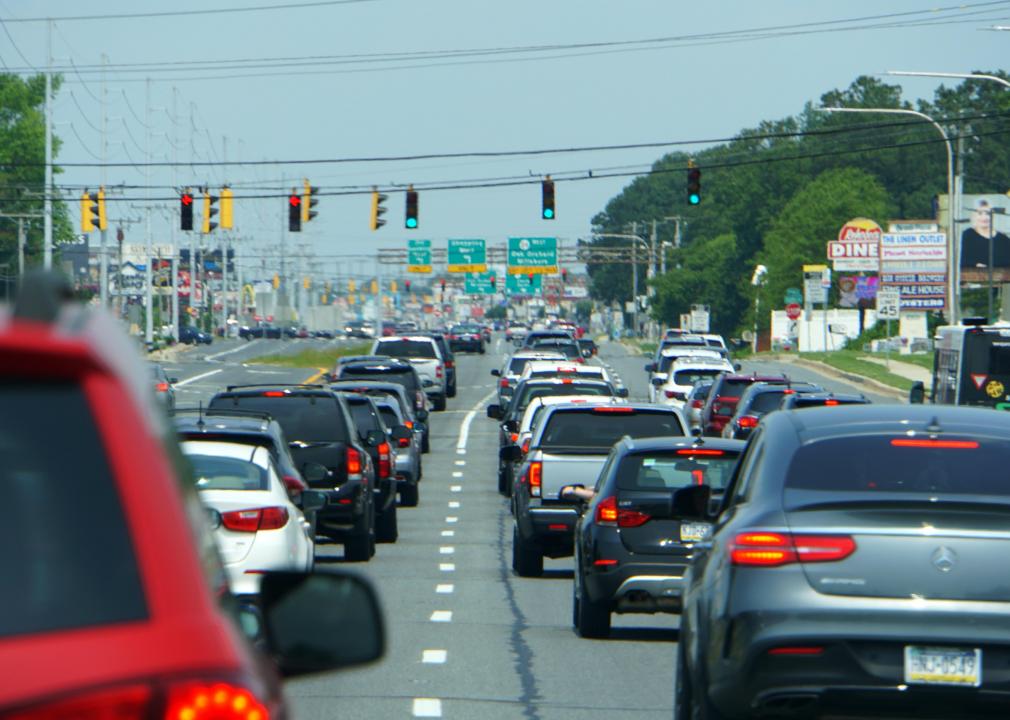
Khairil Azhar Junos // Shutterstock
#27. Delaware
– Fatalities per 100 million vehicle miles: 1.09 (-68% change since 1975)
– Total fatalities: 111 (-9.0% change since 1975)
– Percent of fatalities related to speeding: 29.7% (#21 highest of all states)
– Percent of fatalities with a driver over .08 BAC: 25.2% (#38 highest of all states)
– Deaths by road user type: 43.2% car, 33.3% light trucks, 1.2% large trucks, 21.0% motorcycles, 1.2% other or unknown
Delaware has had a hands-free phone law in place since 2011. Drivers may not use phones, laptops, games, or other electronic devices while driving, and fines start at $100 for a first offense.

marekuliasz // Shutterstock
#26. Nebraska
– Fatalities per 100 million vehicle miles: 1.10 (-67% change since 1975)
– Total fatalities: 230 (-38.0% change since 1975)
– Percent of fatalities related to speeding: 12.6% (#48 highest of all states)
– Percent of fatalities with a driver over .08 BAC: 28.7% (#21 highest of all states)
– Deaths by road user type: 42.2% car, 37.9% light trucks, 5.8% large trucks, 11.2% motorcycles, 2.9% other or unknown
Most deaths from motor vehicle crashes in 2018 involved only one vehicle. Nebraska, however, recorded 57% of deaths in multi-vehicle crashes, the highest percentage in the country.

ESB Professional // Shutterstock
#25. Georgia
– Fatalities per 100 million vehicle miles: 1.14 (-67% change since 1975)
– Total fatalities: 1,504 (+11.0% change since 1975)
– Percent of fatalities related to speeding: 17.8% (#44 highest of all states)
– Percent of fatalities with a driver over .08 BAC: 24.9% (#40 highest of all states)
– Deaths by road user type: 44.8% car, 37.5% light trucks, 2.8% large trucks, 12.7% motorcycles, 2.2% other or unknown
Georgia has had a handheld phone prohibition in place since 2018. The state had forbidden texting while driving in 2010, but critics there and elsewhere said such a ban was unenforceable since drivers can still use their hands to place calls.

Canva
#24. Colorado
– Fatalities per 100 million vehicle miles: 1.17 (-67% change since 1975)
– Total fatalities: 632 (+9.0% change since 1975)
– Percent of fatalities related to speeding: 33.2% (#15 highest of all states)
– Percent of fatalities with a driver over .08 BAC: 29.7% (#18 highest of all states)
– Deaths by road user type: 34.0% car, 43.3% light trucks, 2.5% large trucks, 19.8% motorcycles, 0.4% other or unknown
Colorado is considering a handheld ban on phone use while driving. A 2017 survey by the Colorado Department of Transportation found that 89% of the state’s drivers admitted to driving distracted in the previous seven days before being surveyed.

Peter James Sampson // Shutterstock
#23. Nevada
– Fatalities per 100 million vehicle miles: 1.17 (-75% change since 1975)
– Total fatalities: 330 (+51.0% change since 1975)
– Percent of fatalities related to speeding: 27.9% (#26 highest of all states)
– Percent of fatalities with a driver over .08 BAC: 26.4% (#33 highest of all states)
– Deaths by road user type: 42.4% car, 29.8% light trucks, 1.3% large trucks, 24.8% motorcycles, 1.7% other or unknown
Nevada enacted several new driving laws this year, among them a helmet requirement for moped riders on state roads, the prosecution of reckless driving in parking lots and other places open to the public, and a requirement for motorists approaching a traffic accident to slow down and move over.
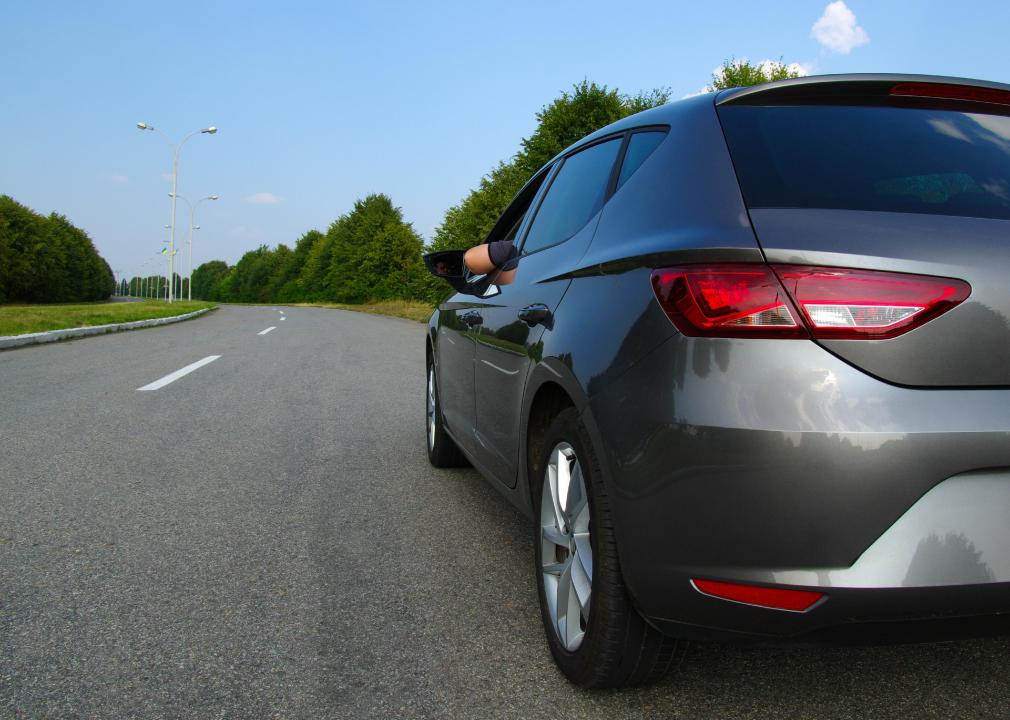
irin-k // Shutterstock
#22. Pennsylvania
– Fatalities per 100 million vehicle miles: 1.17 (-64% change since 1975)
– Total fatalities: 1,190 (-43.0% change since 1975)
– Percent of fatalities related to speeding: 38.2% (#9 highest of all states)
– Percent of fatalities with a driver over .08 BAC: 28.1% (#24 highest of all states)
– Deaths by road user type: 47.5% car, 29.7% light trucks, 2.1% large trucks, 17.0% motorcycles, 3.7% other or unknown
Some Pennsylvania lawmakers favor tighter laws governing phones, and at the beginning of 2020, its House passed a ban on handheld phone use. In recent years, the state has required children under 2 to be buckled into a rear-facing car seat and also increased the penalty for texting and driving.
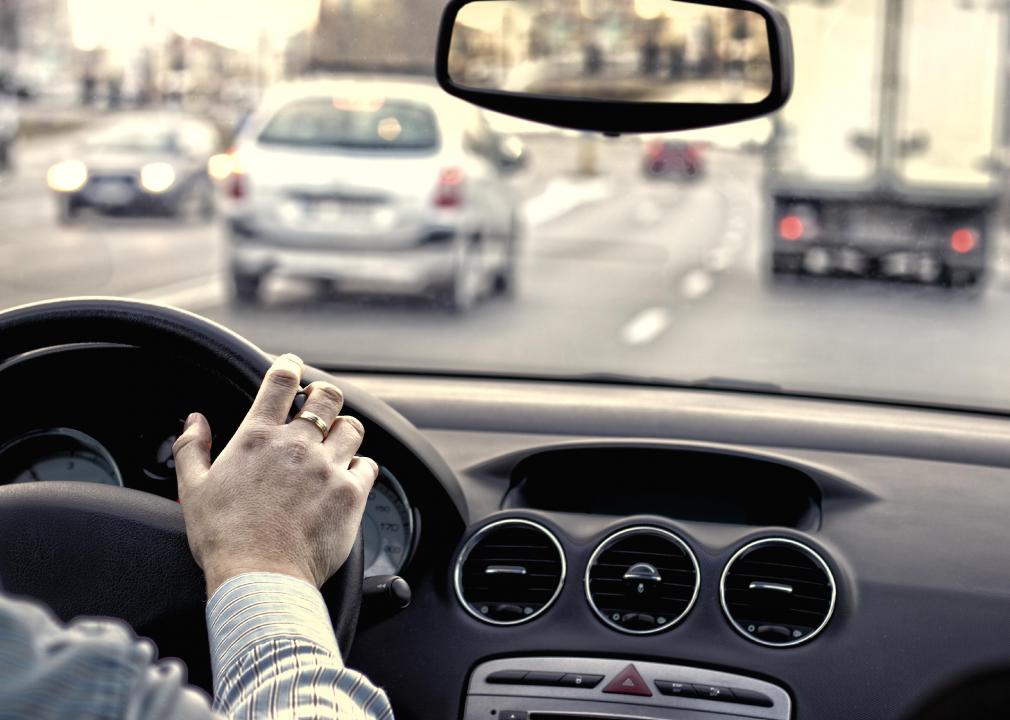
ambrozinio // Shutterstock
#21. North Carolina
– Fatalities per 100 million vehicle miles: 1.19 (-71% change since 1975)
– Total fatalities: 1,437 (-5.0% change since 1975)
– Percent of fatalities related to speeding: 22.8% (#37 highest of all states)
– Percent of fatalities with a driver over .08 BAC: 29.3% (#19 highest of all states)
– Deaths by road user type: 47.0% car, 33.4% light trucks, 2.1% large trucks, 16.0% motorcycles, 1.5% other or unknown
Teenage drivers in North Carolina may skip a road test and get a limited driver’s license during the COVID-19 pandemic under a bill signed by Gov. Roy Cooper in June 2020. The tests were suspended for health and safety reasons.
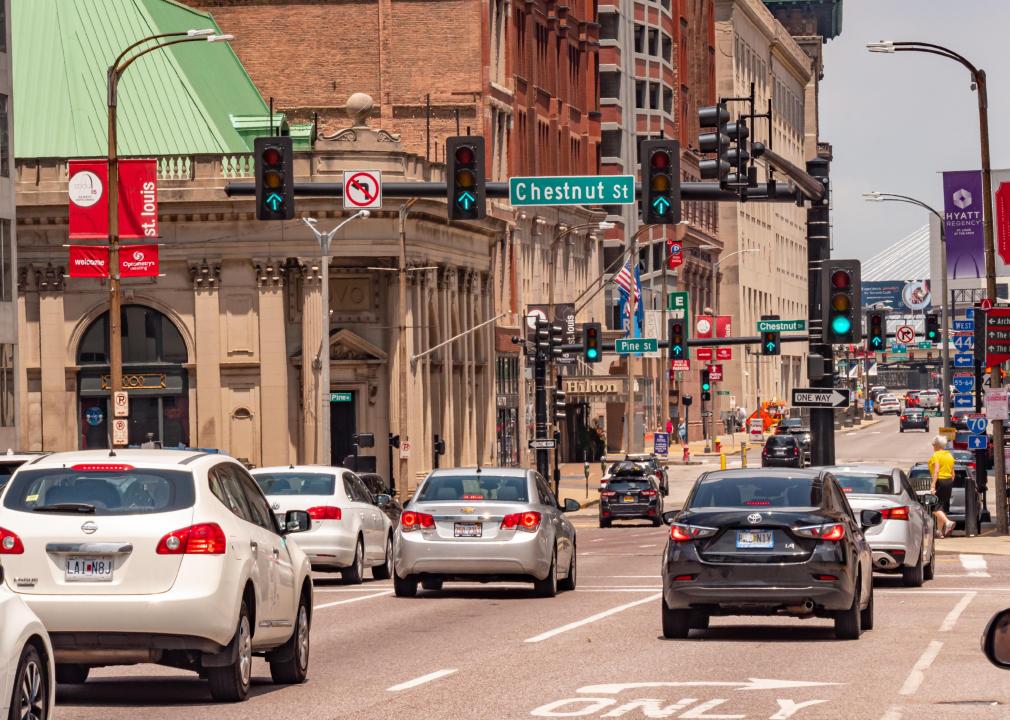
4kclips // Shutterstock
#20. Missouri
– Fatalities per 100 million vehicle miles: 1.20 (-65% change since 1975)
– Total fatalities: 921 (-12.0% change since 1975)
– Percent of fatalities related to speeding: 39.8% (#8 highest of all states)
– Percent of fatalities with a driver over .08 BAC: 26.1% (#34 highest of all states)
– Deaths by road user type: 42.6% car, 37.1% light trucks, 3.8% large trucks, 13.8% motorcycles, 2.7% other or unknown
Missouri is one of only three states that doesn’t ban texting by adults while driving. Teenagers are prohibited from texting, however, and lawmakers have considered expanding the ban.

Canva
#19. Kansas
– Fatalities per 100 million vehicle miles: 1.26 (-62% change since 1975)
– Total fatalities: 404 (-21.0% change since 1975)
– Percent of fatalities related to speeding: 23.3% (#36 highest of all states)
– Percent of fatalities with a driver over .08 BAC: 21.8% (#48 highest of all states)
– Deaths by road user type: 36.8% car, 38.4% light trucks, 5.7% large trucks, 17.3% motorcycles, 1.9% other or unknown
Unlike its neighbor, Kansas banned texting by all drivers in 2011 ago, but the state doesn’t have a handheld ban for phone use. Only 80% of Kansans in the front seat, driver or passenger, buckle up, despite a law requiring seat belt use. That’s below the national average of 86%.

Dawid S Swierczek // Shutterstock
#18. Tennessee
– Fatalities per 100 million vehicle miles: 1.28 (-63% change since 1975)
– Total fatalities: 1,041 (-8.0% change since 1975)
– Percent of fatalities related to speeding: 16.0% (#46 highest of all states)
– Percent of fatalities with a driver over .08 BAC: 23.3% (#44 highest of all states)
– Deaths by road user type: 43.8% car, 32.7% light trucks, 2.6% large trucks, 18.8% motorcycles, 2.1% other or unknown
Last year, Tennessee passed a ban on handheld phone use. Hands-free use is allowed, and fines for violating the law start at $50. Tennessee’s seat belt use by those in the front seat is just below the national average at 84%.
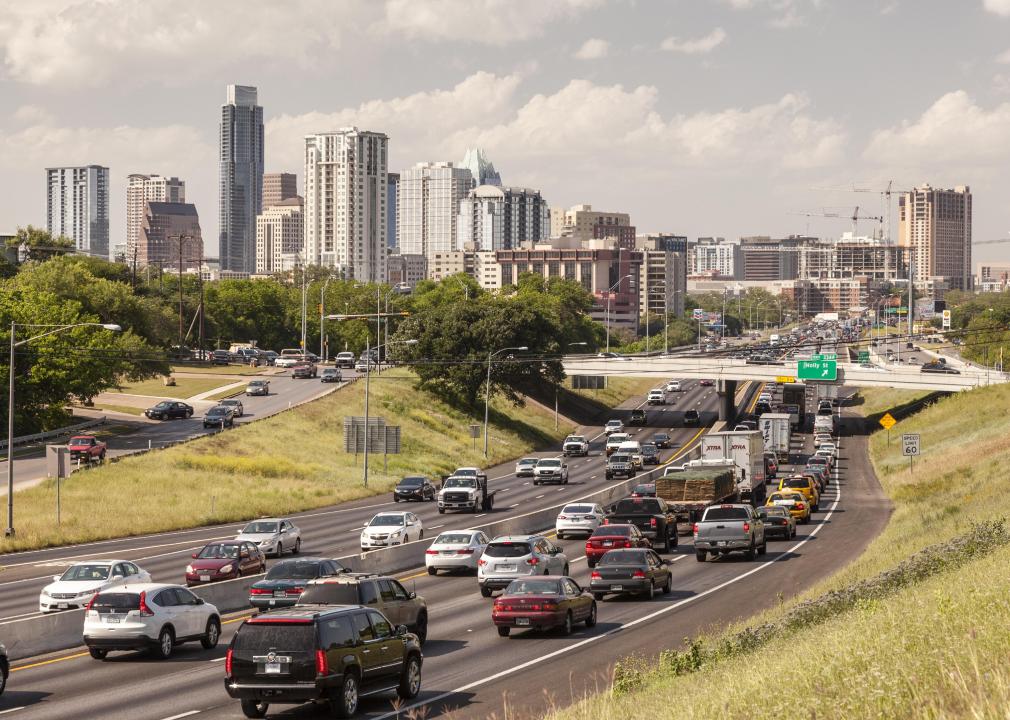
Philip Lange // Shutterstock
#17. Texas
– Fatalities per 100 million vehicle miles: 1.29 (-68% change since 1975)
– Total fatalities: 3,642 (+8.0% change since 1975)
– Percent of fatalities related to speeding: 27.2% (#28 highest of all states)
– Percent of fatalities with a driver over .08 BAC: 39.5% (#2 highest of all states)
– Deaths by road user type: 38.6% car, 41.4% light trucks, 4.7% large trucks, 14.2% motorcycles, 1.2% other or unknown
Texas’ ban on handheld phone use applies only while in a school crossing zone and on public school property. The state has a high rate of seat belt use at 94%.

Charles Knowles // Shutterstock
#16. Idaho
– Fatalities per 100 million vehicle miles: 1.30 (-73% change since 1975)
– Total fatalities: 231 (-18.0% change since 1975)
– Percent of fatalities related to speeding: 19.9% (#42 highest of all states)
– Percent of fatalities with a driver over .08 BAC: 25.1% (#39 highest of all states)
– Deaths by road user type: 34.8% car, 36.2% light trucks, 5.7% large trucks, 18.1% motorcycles, 5.2% other or unknown
Like many other states, Idaho just passed a hands-free phone law in July 2020, and the ban applies even when stopped at a red light or stop sign. Distracted driving contributed to one of every five crashes in Idaho, according to the Idaho State Police. Texting while driving has been prohibited since 2012.
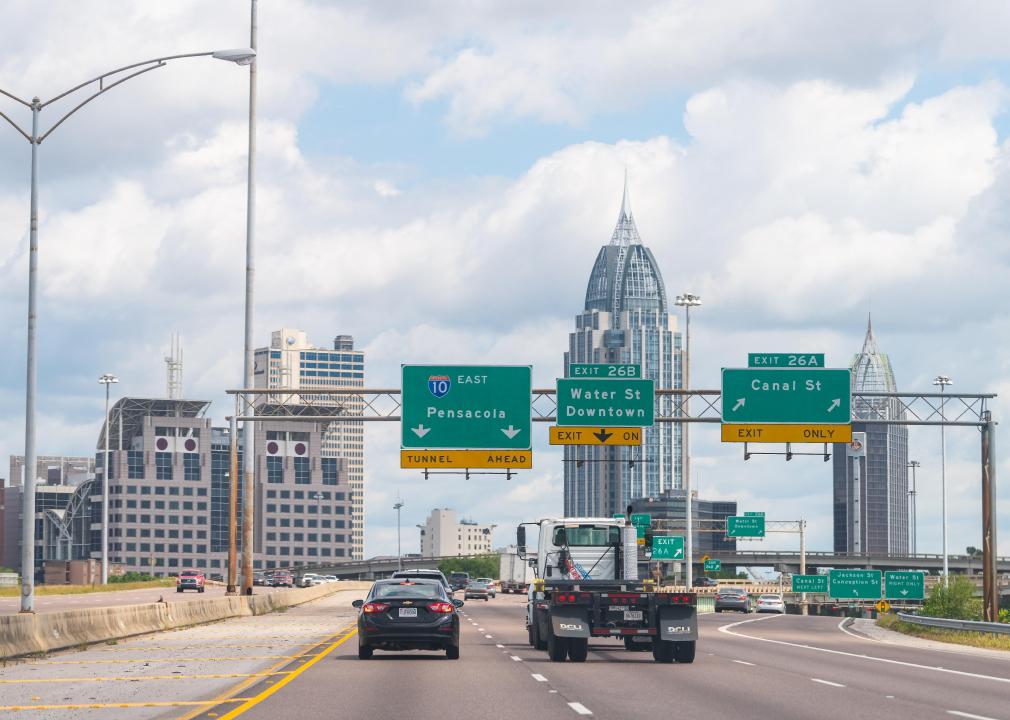
Andriy Blokhin // Shutterstock
#15. Alabama
– Fatalities per 100 million vehicle miles: 1.34 (-63% change since 1975)
– Total fatalities: 953 (+6.0% change since 1975)
– Percent of fatalities related to speeding: 27.5% (#27 highest of all states)
– Percent of fatalities with a driver over .08 BAC: 25.8% (#37 highest of all states)
– Deaths by road user type: 49.2% car, 36.7% light trucks, 2.8% large trucks, 9.8% motorcycles, 1.5% other or unknown
Alabama passed three new laws in 2019 meant to improve road safety. The first is an anti-road-rage law that prohibits drivers from remaining in the left lane for more than a mile-and-a-half without passing. The other two require seat belts in the back seat as well as the front and increase fines for drivers who fail to move over or slow down when passing stopped emergency vehicles.
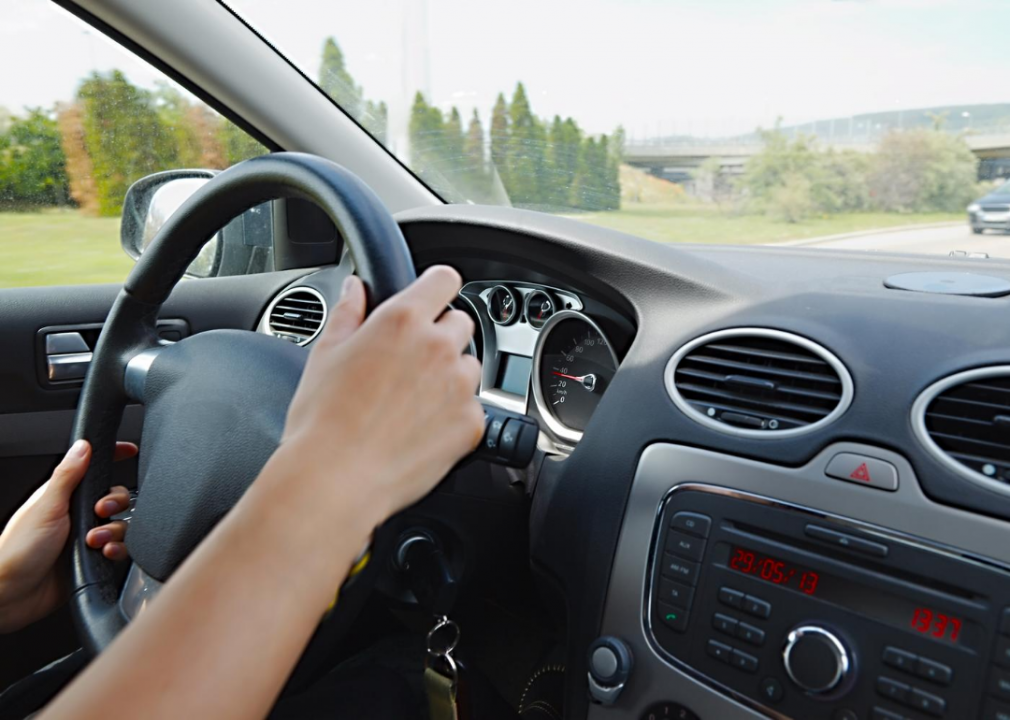
Canva
#14. South Dakota
– Fatalities per 100 million vehicle miles: 1.34 (-64% change since 1975)
– Total fatalities: 130 (-33.0% change since 1975)
– Percent of fatalities related to speeding: 40.0% (#7 highest of all states)
– Percent of fatalities with a driver over .08 BAC: 34.6% (#5 highest of all states)
– Deaths by road user type: 36.1% car, 42.9% light trucks, 4.2% large trucks, 13.4% motorcycles, 3.4% other or unknown
South Dakota has one of the highest arrest rates for driving while under the influence, with the other top states being neighbors North Dakota and Wyoming. The rankings, presented on the AAA website in January 2020, were based on National Highway Traffic Safety Administration statistics on fatal crashes and other data and calculated by BackgroundChecks.org.
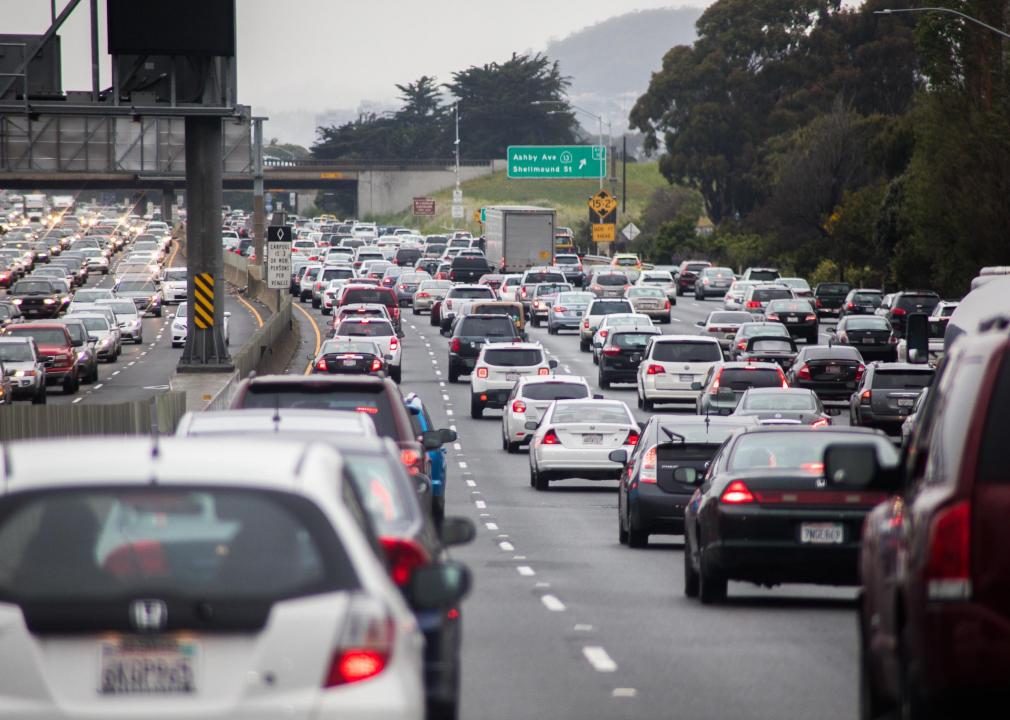
Keep Smiling Photography // Shutterstock
#13. Oregon
– Fatalities per 100 million vehicle miles: 1.37 (-61% change since 1975)
– Total fatalities: 506 (-10.0% change since 1975)
– Percent of fatalities related to speeding: 21.7% (#40 highest of all states)
– Percent of fatalities with a driver over .08 BAC: 30.2% (#14 highest of all states)
– Deaths by road user type: 34.7% car, 35.2% light trucks, 2.9% large trucks, 18.8% motorcycles, 8.4% other or unknown
Oregon’s steep fine for first-time offenders of its distracted driving law—$1,000—put it at the top of a ranking of such laws in the country. Rosenblum Law, a firm based in New York and New Jersey, analyzed all 50 states’ laws and awarded Oregon the distinction of having the country’s harshest distracted driving law.
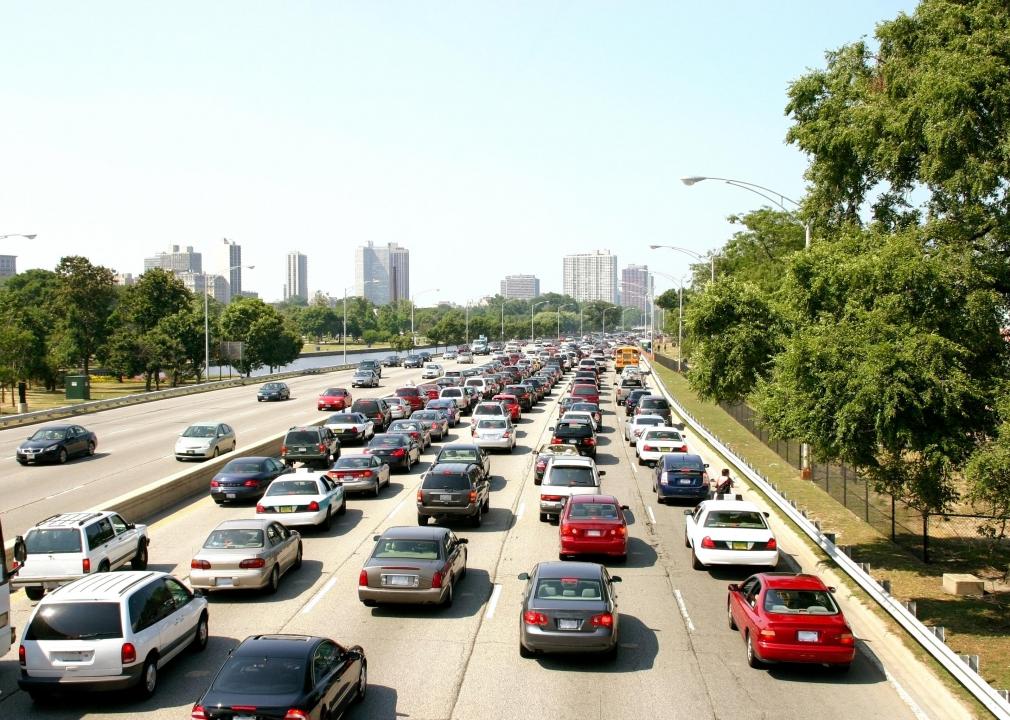
Amy Tseng // Shutterstock
#12. Arkansas
– Fatalities per 100 million vehicle miles: 1.41 (-65% change since 1975)
– Total fatalities: 516 (-8.0% change since 1975)
– Percent of fatalities related to speeding: 25.4% (#33 highest of all states)
– Percent of fatalities with a driver over .08 BAC: 26.0% (#36 highest of all states)
– Deaths by road user type: 36.8% car, 40.8% light trucks, 5.8% large trucks, 14.6% motorcycles, 2.0% other or unknown
Arkansas set the maximum speed limit for highways at 75 miles per hour if the road is outside a city and has at least four lanes divided by a median. The state is allowing police to stop drivers solely for using a handheld wireless device in a school zone.
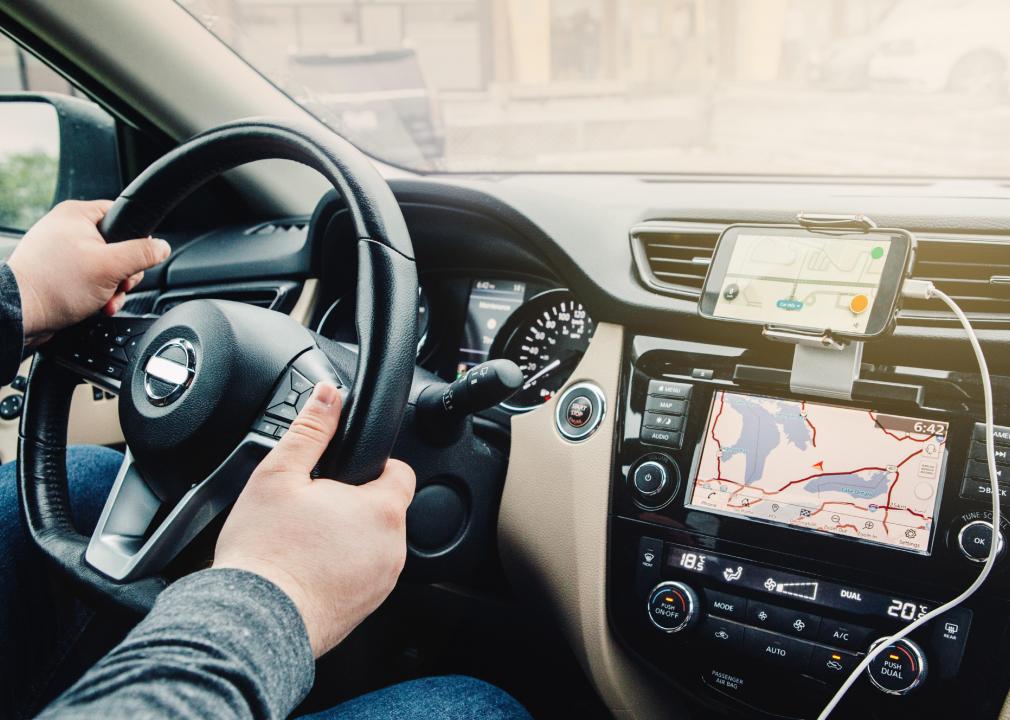
Anna Kraynova // Shutterstock
#11. Florida
– Fatalities per 100 million vehicle miles: 1.41 (-56% change since 1975)
– Total fatalities: 3,133 (+57.0% change since 1975)
– Percent of fatalities related to speeding: 9.7% (#49 highest of all states)
– Percent of fatalities with a driver over .08 BAC: 26.0% (#35 highest of all states)
– Deaths by road user type: 44.5% car, 26.2% light trucks, 2.4% large trucks, 25.6% motorcycles, 1.3% other or unknown
Florida began issuing tickets, not warnings, to drivers caught texting while driving. Florida had already banned texting by motorists, but police officers could not stop someone solely for texting. Drivers must now use hands-free phones in school and work zones.

MakDill // Shutterstock
#10. Montana
– Fatalities per 100 million vehicle miles: 1.43 (-72% change since 1975)
– Total fatalities: 182 (-37.0% change since 1975)
– Percent of fatalities related to speeding: 36.8% (#11 highest of all states)
– Percent of fatalities with a driver over .08 BAC: 43.4% (#1 highest of all states)
– Deaths by road user type: 26.1% car, 53.9% light trucks, 3.6% large trucks, 12.7% motorcycles, 3.6% other or unknown
Across the country, just over 50% of deaths resulting from vehicle crashes involved only a single vehicle. Montana topped that figure significantly and led the country at 71%.

Katrina Leigh // Shutterstock
#9. New Mexico
– Fatalities per 100 million vehicle miles: 1.43 (-74% change since 1975)
– Total fatalities: 391 (-30.0% change since 1975)
– Percent of fatalities related to speeding: 33.8% (#14 highest of all states)
– Percent of fatalities with a driver over .08 BAC: 27.6% (#26 highest of all states)
– Deaths by road user type: 36.8% car, 38.2% light trucks, 5.4% large trucks, 15.2% motorcycles, 4.4% other or unknown
New Mexico comes in at sixth place in a recent ranking of the 10 top states with the most severe DUI problem. A second study in 2019 by Safewise placed the state fourth for fatalities caused by impaired driving. Mothers Against Drunk Driving credits the state with the first all-offender interlock law in 2005—interlocks are breathalyzers that can prevent a car from starting.
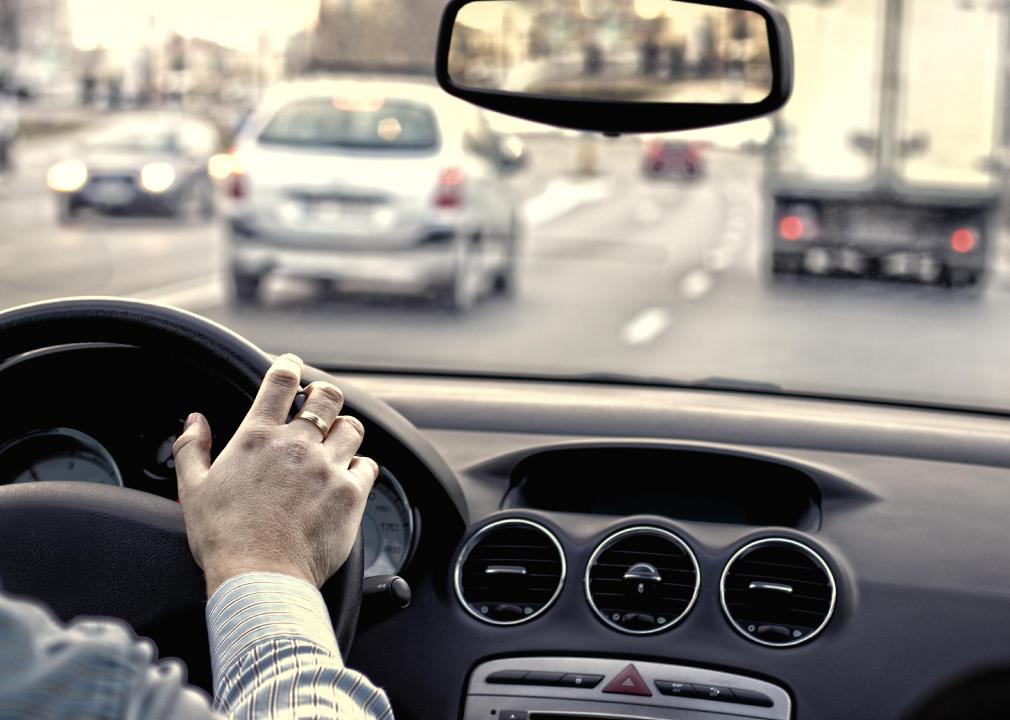
ambrozinio // Shutterstock
#8. Oklahoma
– Fatalities per 100 million vehicle miles: 1.44 (-57% change since 1975)
– Total fatalities: 655 (-13.0% change since 1975)
– Percent of fatalities related to speeding: 22.4% (#38 highest of all states)
– Percent of fatalities with a driver over .08 BAC: 22.1% (#46 highest of all states)
– Deaths by road user type: 40.1% car, 37.5% light trucks, 5.2% large trucks, 15.9% motorcycles, 1.4% other or unknown
Oklahoma made it illegal to text and drive in 2015, with a potential penalty of $100. Its ban on handheld phone use applies only to drivers with a learner or intermediate license. Oklahoma’s use of seat belts in the front seat falls just below the national average, 84% versus 86%.

Japan_mark3 // Shutterstock
#7. Alaska
– Fatalities per 100 million vehicle miles: 1.46 (-67% change since 1975)
– Total fatalities: 80 (-29.0% change since 1975)
– Percent of fatalities related to speeding: 52.5% (#1 highest of all states)
– Percent of fatalities with a driver over .08 BAC: 36.3% (#4 highest of all states)
– Deaths by road user type: 23.1% car, 46.2% light trucks, 3.1% large trucks, 18.5% motorcycles, 9.2% other or unknown
Alaska passed a ban on handheld phone use in school zones or on school grounds in 2019, though hands-free use of a phone is allowed. The state comes in ninth on a list of the 10 most dangerous states for DUI deaths, according to BackgroundChecks.org.

Canva
#6. Kentucky
– Fatalities per 100 million vehicle miles: 1.46 (-58% change since 1975)
– Total fatalities: 724 (-16.0% change since 1975)
– Percent of fatalities related to speeding: 15.3% (#47 highest of all states)
– Percent of fatalities with a driver over .08 BAC: 18.9% (#50 highest of all states)
– Deaths by road user type: 45.1% car, 35.4% light trucks, 2.7% large trucks, 14.9% motorcycles, 1.9% other or unknown
Kentucky is strengthening its DUI laws by offering ignition locks to everyone convicted of drunk driving. First-time offenders can choose a lock in exchange for a lighter penalty, but repeat offenders will be required to install one.

Medard L Lefevre // Shutterstock
#5. West Virginia
– Fatalities per 100 million vehicle miles: 1.51 (-65% change since 1975)
– Total fatalities: 294 (-36.0% change since 1975)
– Percent of fatalities related to speeding: 29.9% (#20 highest of all states)
– Percent of fatalities with a driver over .08 BAC: 19.4% (#49 highest of all states)
– Deaths by road user type: 39.2% car, 35.1% light trucks, 4.9% large trucks, 14.7% motorcycles, 6.0% other or unknown
West Virginia is imposing new restrictions on teenage drivers, enforcing a stricter curfew and reducing the number of passengers in a new driver’s car. The terrible condition of many of the state’s roads contribute to the danger though in 2017 voters approved $2.6 billion in bonds for improvements.

Andrew Zarivny // Shutterstock
#4. Arizona
– Fatalities per 100 million vehicle miles: 1.53 (-63% change since 1975)
– Total fatalities: 1,010 (+51.0% change since 1975)
– Percent of fatalities related to speeding: 28.2% (#25 highest of all states)
– Percent of fatalities with a driver over .08 BAC: 28.2% (#22 highest of all states)
– Deaths by road user type: 36.6% car, 31.0% light trucks, 2.4% large trucks, 20.1% motorcycles, 9.8% other or unknown
Arizona has banned texting and other handheld use of phones, though penalties will not begin until 2021, and local laws can remain in place until next year, when the law takes full effect. A highway that runs through Arizona, Interstate 10, has been designated one of the most dangerous in the country, according to a study that looked at fatalities between May through September from 2015 to 2017.

Tim Roberts Photography // Shutterstock
#3. Louisiana
– Fatalities per 100 million vehicle miles: 1.53 (-67% change since 1975)
– Total fatalities: 768 (-18.0% change since 1975)
– Percent of fatalities related to speeding: 17.7% (#45 highest of all states)
– Percent of fatalities with a driver over .08 BAC: 28.1% (#23 highest of all states)
– Deaths by road user type: 42.1% car, 39.1% light trucks, 3.0% large trucks, 13.8% motorcycles, 2.1% other or unknown
Some lawmakers in Louisiana have tried to pass a ban on handheld phone use while driving. A bill passed the state’s Senate in May but was then defeated by the House over objections to what some saw as an infringement on individual liberties. Louisiana already prohibits texting while driving.
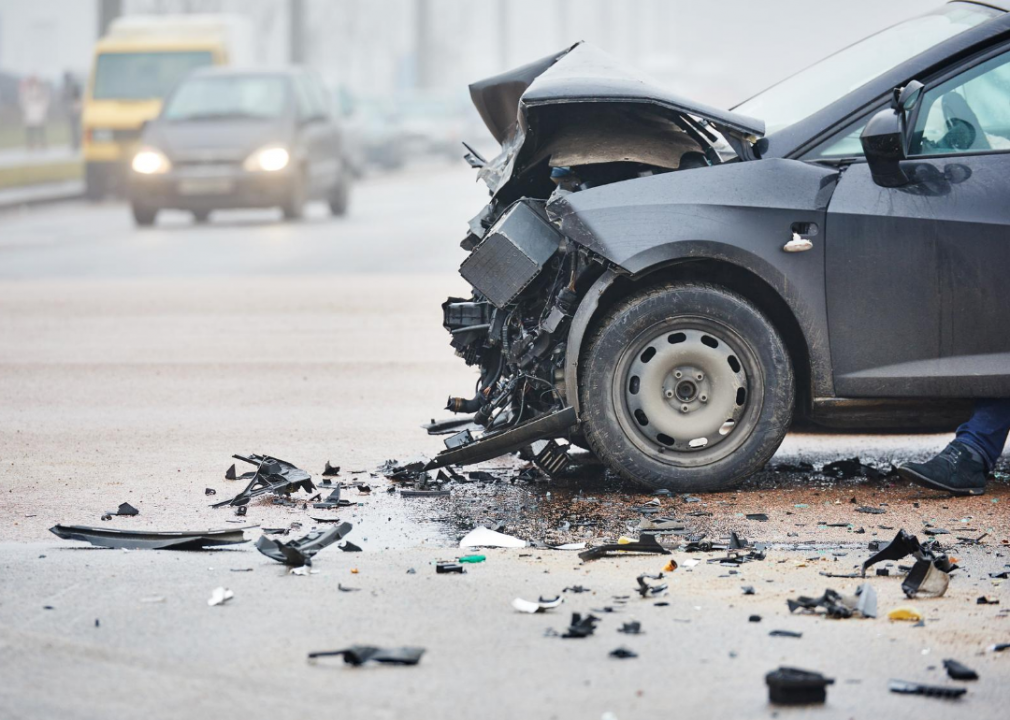
Canva
#2. Mississippi
– Fatalities per 100 million vehicle miles: 1.63 (-57% change since 1975)
– Total fatalities: 664 (+22.0% change since 1975)
– Percent of fatalities related to speeding: 7.2% (#50 highest of all states)
– Percent of fatalities with a driver over .08 BAC: 24.5% (#41 highest of all states)
– Deaths by road user type: 46.0% car, 40.4% light trucks, 3.2% large trucks, 7.2% motorcycles, 3.2% other or unknown
In recent years, Mississippi put a prohibition on riding in the back of a pickup truck, required everyone in a vehicle wear a seatbelt, and required drivers to use the left lane for passing. The state ranks fifth on a list of the top 10 states with the worst DUI problems, as compiled by BackgroundChecks.org using 2018 statistics from the National Highway Traffic Safety Administration as well as arrest and census data.
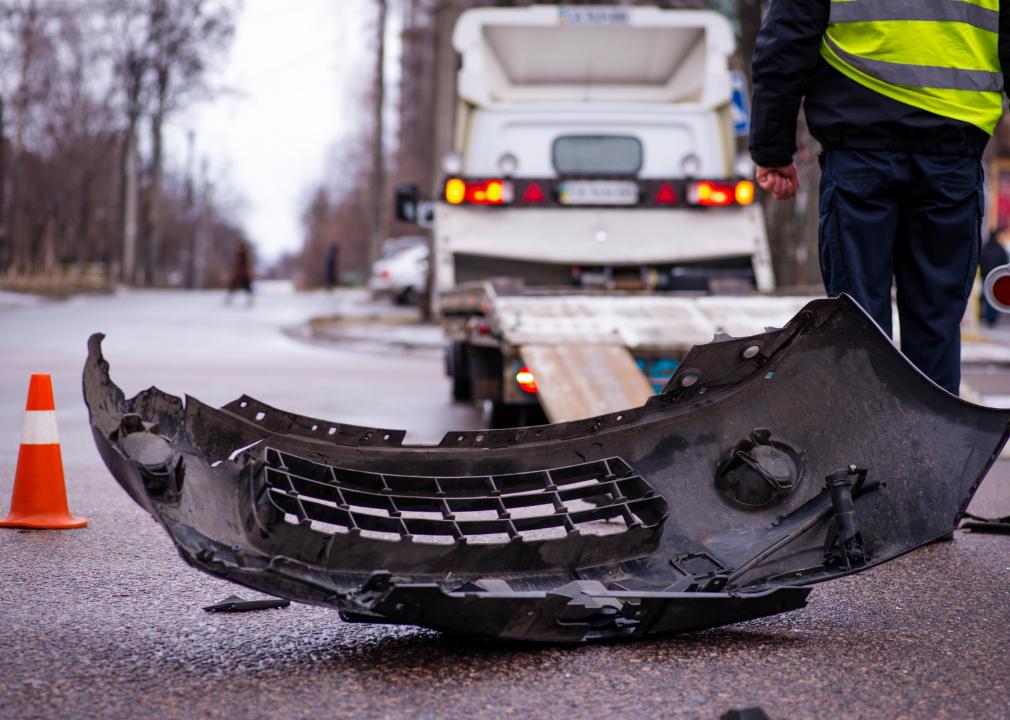
funnyangel // Shutterstock
#1. South Carolina
– Fatalities per 100 million vehicle miles: 1.83 (-54% change since 1975)
– Total fatalities: 1,037 (+26.0% change since 1975)
– Percent of fatalities related to speeding: 43.1% (#5 highest of all states)
– Percent of fatalities with a driver over .08 BAC: 28.1% (#25 highest of all states)
– Deaths by road user type: 44.1% car, 36.1% light trucks, 2.5% large trucks, 16.7% motorcycles, 0.7% other or unknown
South Carolina is one of seven southern states—the other six are Mississippi, Alabama, Texas, Louisiana, Arkansas, and North Carolina—that rank among the highest for DUI death rates, according to an analysis by BackgroundChecks.org. The state includes an especially dangerous intersection that is the site of the sixth highest number of crashes of any spot in the United States.
